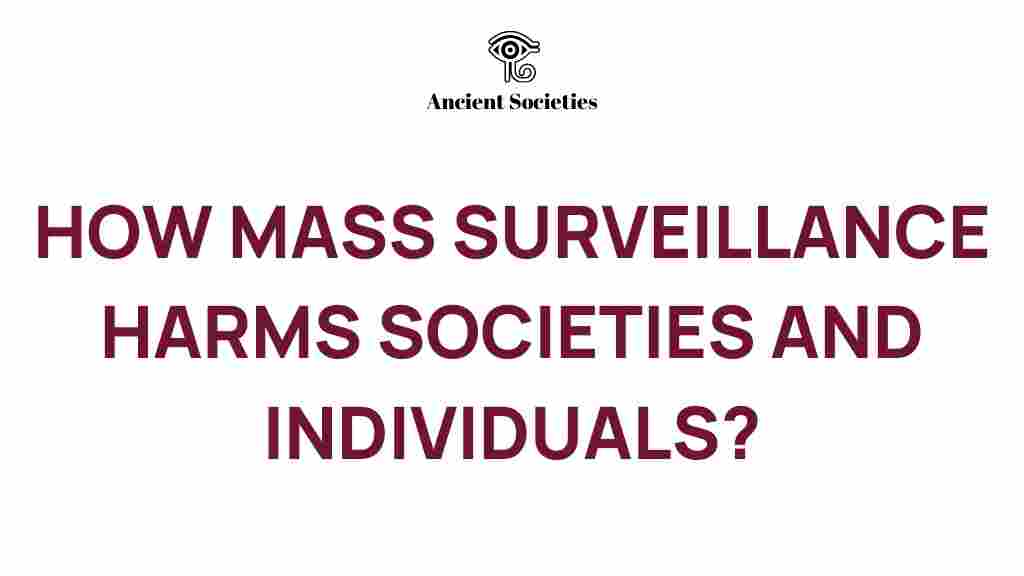The Hidden Costs of Mass Surveillance: A Threat to Society and Self
In an era defined by rapid technological advancement, mass surveillance has become an omnipresent aspect of modern life. While proponents argue that it enhances security and aids in crime prevention, the hidden costs of mass surveillance pose significant threats to privacy, individual rights, and civil liberties. This article explores the implications of mass surveillance on society and the individual, examining the ethical dilemmas it raises and the potential consequences for our freedoms.
Understanding Mass Surveillance
Mass surveillance refers to the extensive monitoring of individuals and groups, typically conducted by governments or corporations. It involves the systematic collection of data from various sources, including social media, phone calls, emails, and even public spaces through cameras. The primary goal is often framed as enhancing security and preventing crime, but it raises critical questions regarding the rights of individuals.
The Balance Between Security and Privacy
As technology evolves, the balance between security and privacy becomes increasingly precarious. Governments justify mass surveillance in the name of national security, citing terrorist threats and criminal activities as primary motivators. However, this often leads to a society where:
- Individuals are constantly monitored, leading to a chilling effect on free speech and expression.
- Data collection practices become invasive, undermining personal privacy.
- Ethical considerations are overlooked in favor of perceived security benefits.
Privacy: A Fundamental Right
Privacy is a fundamental human right recognized in various international treaties and national constitutions. The right to privacy is essential for the exercise of other freedoms, including the freedom of expression and the right to association. Mass surveillance disrupts this balance, often resulting in:
- The erosion of trust between citizens and their governments.
- A loss of control over personal information.
- Increased anxiety and paranoia among individuals who feel they are always being watched.
The Ethics of Mass Surveillance
The ethical implications of mass surveillance extend beyond legal frameworks. It raises questions about the morality of data collection practices and the justification of privacy violations for the sake of security. Ethical considerations include:
- Informed consent: Are individuals aware of the extent to which they are being monitored?
- Transparency: Are governments and corporations transparent about their surveillance practices and data usage?
- Accountability: What mechanisms are in place to hold entities responsible for abuses of surveillance?
The Impact of Technology on Surveillance Practices
Technology plays a crucial role in the implementation and expansion of mass surveillance. The advancements in data analytics, artificial intelligence, and facial recognition have enabled unprecedented levels of monitoring. Some of the implications include:
- Enhanced data collection capabilities, allowing for real-time analysis of vast amounts of information.
- Increased accuracy in tracking and identifying individuals, leading to potential misidentifications and wrongful accusations.
- The normalization of surveillance in everyday life, from smart devices to social media.
Data Collection: The New Currency
In today’s digital age, data collection has become a new form of currency. Companies and governments accumulate vast amounts of data on individuals, often without their explicit consent. This data is used for:
- Targeted advertising that exploits personal information.
- Predictive policing that can disproportionately affect marginalized communities.
- Political campaigns that manipulate public opinion based on surveillance data.
This commodification of personal data raises significant ethical concerns about individual rights and the responsibilities of those who collect and manage this information. To learn more about the implications of data privacy, you can visit this resource.
Civil Liberties Under Threat
Mass surveillance poses a direct threat to civil liberties, which are essential for a democratic society. The implications include:
- Suppression of dissent: Individuals may be less likely to engage in protests or political activism if they fear government monitoring.
- Chilling effects on freedom of expression: Knowing they are being watched, individuals may self-censor, stifling creativity and open dialogue.
- Disproportionate impact on marginalized communities: Surveillance practices often target specific demographic groups, exacerbating existing inequalities.
Step-by-Step Process for Safeguarding Privacy
While mass surveillance is a pervasive issue, there are steps individuals can take to safeguard their privacy:
- Educate Yourself: Understand the tools and technologies that contribute to mass surveillance.
- Use Encryption: Protect your communications by using encrypted messaging apps and secure email services.
- Limit Data Sharing: Be mindful of the information you share on social media and other online platforms.
- Advocate for Policy Change: Support organizations and initiatives that promote privacy rights and challenge mass surveillance practices.
- Utilize Privacy Tools: Use browser extensions and VPNs to enhance your online privacy.
Troubleshooting Common Privacy Concerns
In the age of mass surveillance, individuals may encounter various challenges concerning their privacy. Here are some common issues and how to address them:
- Issue: Your online activities are being tracked.
- Solution: Use incognito mode in your browser and consider using privacy-focused search engines.
- Issue: You are receiving targeted ads based on personal information.
- Solution: Adjust your privacy settings on social media platforms and consider using ad blockers.
- Issue: You feel unsafe using public Wi-Fi.
- Solution: Avoid accessing sensitive information on public networks and use a VPN for added security.
Conclusion: The Future of Privacy in a Surveillance Society
Mass surveillance presents a complex challenge for modern society. As we navigate the fine line between security and privacy, it is imperative to remain vigilant about the implications of data collection and the erosion of civil liberties. By understanding the hidden costs of mass surveillance, individuals can take proactive steps to protect their privacy and advocate for their rights.
The future of privacy relies on an informed society that values individual rights over unchecked surveillance. It is essential to engage in conversations about ethics, technology, and security to ensure that our civil liberties are not sacrificed in the name of safety. Only through collective awareness and action can we reclaim our privacy and uphold the principles of a free society.
This article is in the category Society and created by AncientSocieties Team
